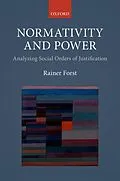Humans are justificatory beingsthey offer, demand, and require justifications. The rules and institutions they follow rest on justification narratives that have evolved over time and, taken together, constitute a dynamic and tension-laden normative order. In this collection of essays, the first translation into English of the ground-breaking Normativität und Macht (Suhrkamp 2015), Rainer Forst presents a new approach to critical theory. Each essay reflects on the basic principles that guide our normative thinking. Forst's argument goes beyond 'ideal' and 'realist' theories and shows how closely the concepts of normativity and power are interrelated, and how power rests on the capacity to influence, determine, and possibly restrict the space of justifications for others. By combining insights from the disciplines of philosophy, history, and the social sciences, Forst re-evaluates theories of justice, as well as of power, and provides the tools for a critical theory of relations of justification.
Autorentext
Rainer Forst is Professor of Political Theory and Philosophy at Goethe University Frankfurt and is co-director of the Cluster of Excellence 'The Formation of Normative Orders' and of the Center for Advanced Studies 'Justitia Amplificata'. In 2012 he was awarded the Gottfried Wilhelm Leibniz Prize of the German Research Foundation. Among his works that have recently appeared in translation are The Right to Justification (2012), Toleration in Conflict (2013), Justification and Critique (2014), and Justice, Democracy and the Right to Justification (a debate with critics, 2014). He is a member of the Berlin-Brandenburg Academy of Sciences and Humanities and sits on the boards of a number of international journals. Most notably he is an associate editor of Ethics and a member of the executive editorial committee of Political Theory.
Inhalt
- Introduction: Orders of Justification. On the Relationship between Philosophy, Social Theory, and Criticism
- I Reason, Normativity, and Power
- 1: Critique of Justifying Reason: Explaining Practical Normativity
- 2: Noumenal Power
- II Justification Narratives and Historical Progress
- 3: On the Concept of a Justification Narrative
- 4: The Concept of Progress
- III Religion, Toleration, and Law
- 5: Religion and Toleration from the Enlightenment to the Post-Secular Era: Bayle, Kant, and Habermas
- 6: One Court and Many Cultures: Jurisprudence in Conflict
- IV Justice, Democracy, and Legitimacy
- 7: Justice after Marx
- 8: Legitimacy, Democracy, and Justice: On the Reflexivity of Normative Orders
- V Transnational Justice
- 9: Realisms in International Political Theory
- 10: Transnational Justice and Non-Domination: A Discourse-Theoretical Approach
